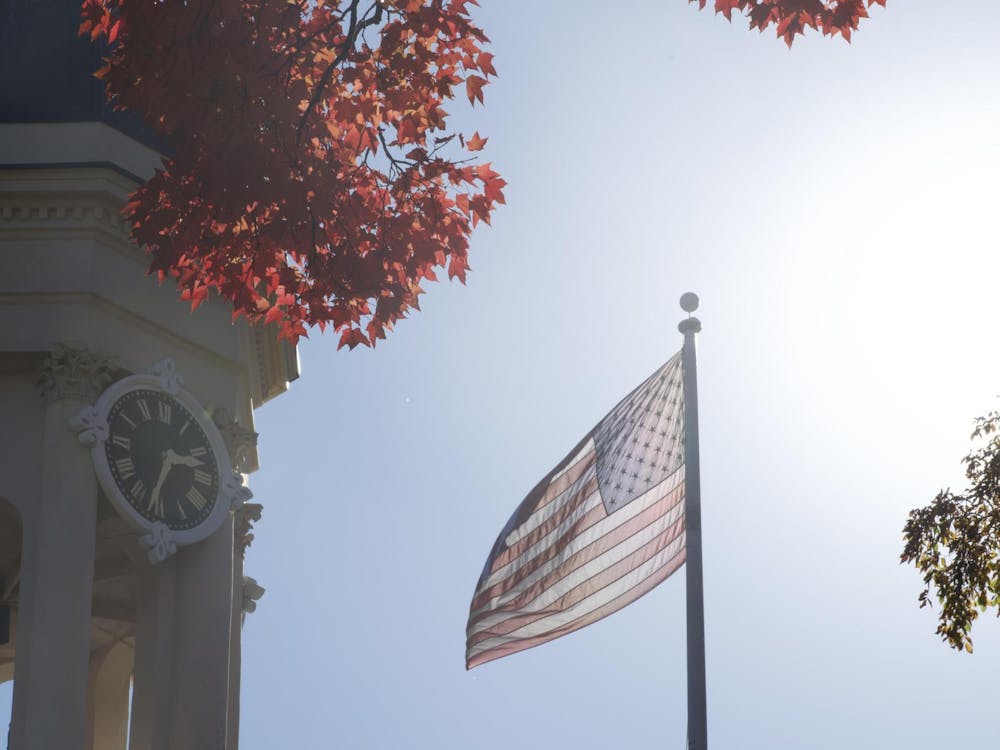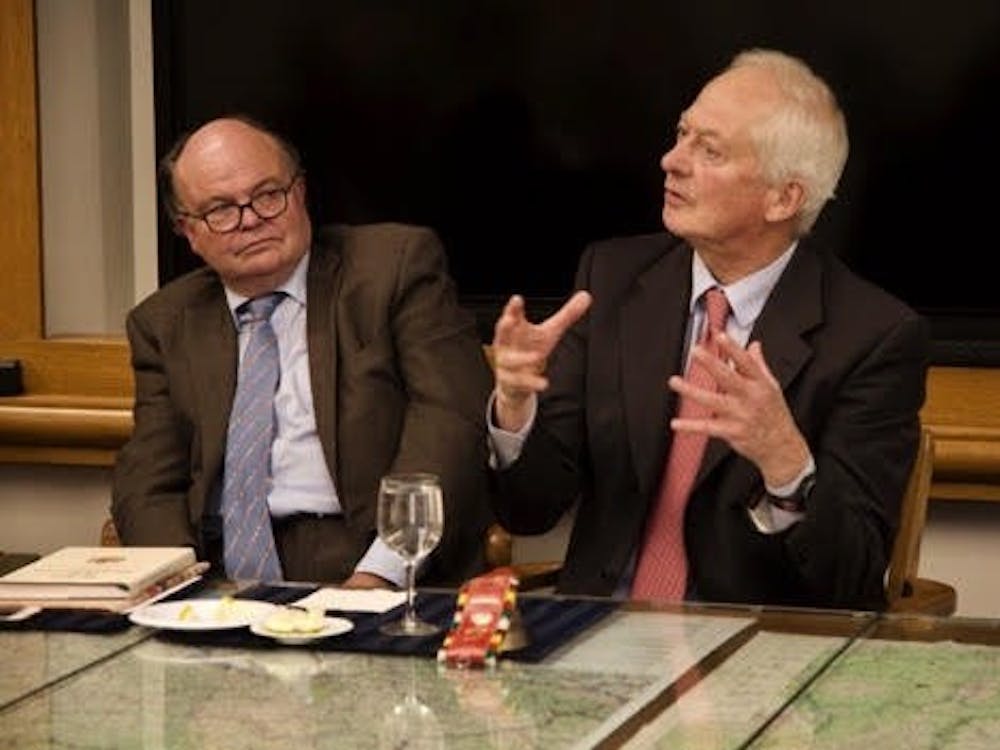Kiera Duffy can't escape the music. In her world, it's everywhere.
Tenors and sopranos echo in the chapel as an audience waits attentively upon every rise and fall in intonation. Basses and altos reverberate through classrooms in addition to nearly every hallway and courtyard. For most of her friends, reading music is easier than reading Shakespeare, and words like mezzo, glissandi and coloratura are part of casual conversation. Music pervades every nook of her campus — well, every nook except the showers.
Students in Duffy's world are forbidden from singing in the showers and can be reported to the dean if they do. Students also cannot sing in their rooms, and quiet hours are sacred.
"You're hearing music all the time, all the time. During the weekdays, it's like cacophony," said Duffy, a senior vocal performance major at Westminster Choir College, a small music college located just minutes north of Nassau Street and the University.
Princeton University is arguably a musical school. Students play pianos in residential colleges and groups can often be found singing a capella in the arches. But for most Princeton students, the music is noticeable. Such a musical environment like the one at Westminster would seem quite strange.
The Princeton area is an academic community with several schools and research institutions crammed within its borders. In addition to the University, Princeton is home to Westminster, Princeton Theological Seminary and the Institute for Advanced Study.
These tiny communities of college students seem hidden from the 'Princeton bubble' and for the most part are secluded behind their own campus walls. Students at the other schools almost never enter the Princeton bubble, and life on a different campus is like life on another world.

Established by John Finley Williamson in Dayton, Ohio, in 1926 to train students for music leadership in churches, Westminster relocated to Princeton in 1932 to a campus about the size of the junior slums.
According to the school's website, "The move to Princeton was motivated by a desire to provide ready access to the great metropolitan centers and orchestras of the eastern seaboard."
When the school faced financial hardship in the 1990s, its administration sought bids for takeover from several schools — including Princeton and Yale. While both universities offered enormous amounts of money and prestige, they wanted Westminster to drop its name and accept their own. The college instead decided to sign a deal with Rider College — now Rider University — that would make Rider the umbrella university and allow Westminster to keeps it name.
"I think a lot of us are jealous [of the University] because of the money," Duffy said. "They're replacing every frame in the chapel just because they can. We just got telephones put in our rooms three years ago."

Most undergraduate students at Westminster today live on campus and can study voice, organ, piano and conducting. Each morning students pack the chapel for a required choir class in which they unite their voices in song.
Students can opt to study German, psychology or computer science, but most courses are oriented toward music. A typical course schedule, which is comparatively busier than Princeton's, may contain opera literature and opera theater or both Westminster choir and symphonic choir.
Music is even incorporated into computer science courses. Taught by a music teacher with a technical background, the course encourages students to learn to use music software.
Performance and touring, however, take precedence over all facets of campus life.
On a normal weekend, several recitals are held on Westminster's campus. At a recent recital, Duffy sang music composed by another Westminster student while other students played violin, piano and cello music that was also composed by the student.
Duffy admits, however, that practicing, touring and performing often intrude on students' social lives.
"It doesn't leave a lot of room for social life, and students sometimes vent about that," Duffy said, her full, clear voice revealing her vocal talent. "People die to go out and do something not related to music."
"There are no parties here," she added bluntly.
While pick-up games of baseball and flag football and escapes to New York and Philadelphia are common outlets for students, some opt for an avenue that is more familiar to Princeton students: attending parties at the 'Street.'
Jesson Burnam, a junior at Westminster, said she goes to the 'Street' about once a month to see friends from high school who attend Princeton.
"I usually talked to the people at the door and told them the people I know, and they would let me in," she said. "I know a bunch of people who would go to the clubs even though they don't know anyone."
But Mary Seeger has never been to the 'Street.' Neither has Adam Freer nor Tara Ebner, all of whom are in their early 20s. For these students at Princeton Theological Seminary — a Presbyterian graduate school — interaction with Princeton undergraduates is limited.
"The only time I come in contact with them is [in] Dillon Gym or in the library," Seminary student Janie Stuart said.
Wedged between the Borough's business district and Princeton University's Graduate College and main campus, the Seminary has 750 students, who come from across the world to study religion.
Sarah, a student who requested that only her first name be used, crosses herself before eating a taco in the school's cafeteria. At a school designed to prepare men and women to serve Christianity in ministries, it would be easy to stereotype the Seminary as a puritanical enclave for nuns and priests.
But Seminary students are quick to refute those stereotypes.
"If you meet someone in a bar, they're defensive if they're not religious," Ellen Johnson said. "They confess that they used to go to church but don't go anymore."
"Yeah," Seeger jumped in. "It's like I'll talk to Jesus for you, but I don't think he's going to forgive you."
And when asked about the social life, nearly every student replies: "the D-Bar." On weekends, most students go to the Graduate College's Debasement Bar to socialize.
Originally part of the University, the Presbyterian General Assembly decided in 1811 that Princeton was growing too secular and broke off to promulgate its more religious mission.
Despite its mission, not all seminary students plan to spend their lives preaching. Though course work is restricted to the Bible, Greek and Hebrew, church history and theology, Stuart wants to go into social work, Ebner hopes to pursue counseling and Freer is taking the University course ECO 101: The National Economy.
Across town, Duffy plans to use her Westminster degree for high musical ambitions.
"Of course the Met [Metropolitan Opera] is a huge goal," she said. "But it's not something that I see as the be all, end all."
Next year, she will continue at Westminster as a residence hall director, while preparing for auditions for graduate school in the fall of 2002.
Though her parents and grandparents have no musical background, Duffy recalled that her great-grandmother was an organist and pianist.
"She worked as a sales lady at Wanamaker's and would practice on the big organ after hours," she said. "One night, Mr. Wanamaker heard her playing and said, 'I want you to play all of my dinner parties.' "







